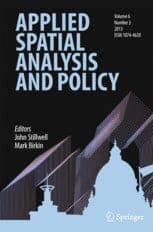The brain drain of educated workers is still felt most severely in China’s central and western provinces, since most knowledge-based industries are generally concentrated in its large coastal cities.
However, low-educated migrant workers increasingly find jobs in their home provinces in the central and western regions because of changing economic and government policy. So says Ye Liu and his colleagues of The Chinese University of Hong Kong in Hong Kong and The University of Leeds in the United Kingdom, who carried out a systematic analysis of migration trends in China over the past 25 years. The article is published in Springer’s journal Applied Spatial Analysis and Policy.
The spatial patterns of age, and education-specific migration mirror the geography of different forms of industries in China. For instance, knowledge-based and advanced service industries that attract educated migrants are highly concentrated in a few large coastal cities such as Beijing and Shanghai. Labor-intensive industries favoring young and low-educated migrant workers are spread across the whole coastal region, where most provinces have become major recipients of less-educated migrants.
However, as a consequence of preferential policies and increasing state investment in industrialization, some interior provinces have recently undergone higher economic growth rates than most coastal provinces. The researchers believe that coastal areas will gradually lose their comparative advantages in developing labor-intensive industries due to the rising labor costs, the evaluation of China’s currency and the depletion of land resources.
The authors conclude, “Our findings suggest that massive eastward migration induced by the unbalanced development strategies and the relaxed migration controls still persisted in the first decade of the 21st century, and that the state’s recent efforts to alleviate regional inequalities have not resulted in the achievement of equilibrium in China’s internal migration system. Nevertheless, as a consequence of preferential policies and increasing state investment, some interior provinces have begun to undergo higher economic growth rates than most coastal provinces in recent years.”
Ye and his colleagues continue to explain, “While the coastal areas have made every endeavor to upgrade their industrial structures and develop knowledge-based economies, many interior areas have undergone a tide of industrialization and received many labor-intensive industries that transferred from coastal regions. Under such circumstances, low-educated and young migrant workers increasingly opted to find jobs in their home provinces located in the central and western regions, while educated migrants continued to move towards coastal large cities.
Reference:
Liu, Y. et al (2014). Interprovincial migration, regional development and state policy in China, 1985-2010, Applied Spatial Analysis and Policy. DOI 10.1007/s12061-014-9102-6.


«For instance, knowledge-based and advanced service industries that attract educated migrants are highly concentrated in a few large coastal cities such as Beijing and Shanghai.» Beijing a «coastal cit[y]» ? What «coast» ? Is the author here speaking of the «Beihai» lake in the park in the centre of town ? Wherever did he or she get this strange notion ?…
Henri